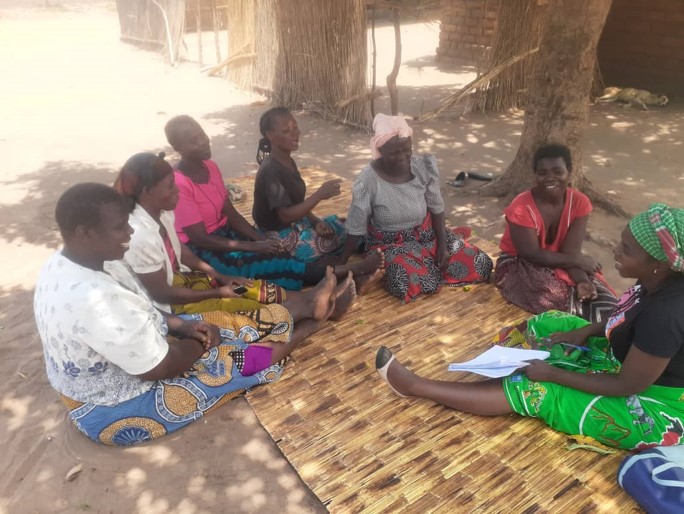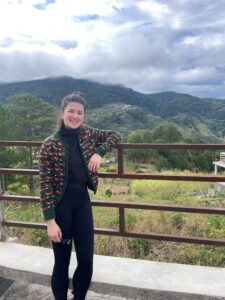University of Oxford
11a Mansfield Rd
OX1 3SZ
UK

Lessah Mandoloma recently returned from fieldwork in Kasungu, Malawi, where she was collecting data for her DPhil research. Lessah is investigating how we can sustainably conduct agricultural trade while also safeguarding biodiversity goals. She studies this question in the context of developing countries, with a particular focus on Malawi.
Saying that my fieldwork experience was both enlightening and humbling would be an understatement. The process was not just about obtaining the data that I needed; rather, it was also about discovering myself and the world around me. I must say that there are also things that I wish I knew prior to starting my fieldwork journey, but now I understand that this is part of the PhD learning curve!
So having reflected on my fieldwork, here are some of the lessons I would like to share that a prospective researcher or student may find useful.
Crop inspections with farmers
Planning
This is one of the most important aspects that is emphasized during fieldwork preparation training. I believe the idea, among many other things, is to think and plan about the travel logistics and the anticipated risks and how a researcher can manage them. All this is true, and I can’t agree more! But one thing I have learnt from my fieldwork is also to be prepared to adapt and adjust as things are moving in the field. No matter how detailed your fieldwork plan is (and yes, you may plan it to the letter), mastering the art of adapting and learning can minimize stress along the way. In my case, I lived in the community where I was doing my research and in this community there were market days, which were not like normal days. We had to adjust to only work in the morning because, come afternoon, most people were at the market either buying or selling or even just going to meet up with friends as per the community’s culture. Funeral ceremonies, weddings and even chieftaincy celebrations were part of the community culture as well. On such days, my team and I couldn’t work. We were either at our base camp or participating in these activities. My message is to plan and prepare your mind for things you can’t control as well.
Data collection with a farmer in the buffer zone
Community expectations
In some cases, I learnt that no matter how much you emphasize the purpose of your research– that the expected output is an academic thesis hopefully leading to peer reviewed papers and policy briefs– the communities will still hold on to some expectation that your research will benefit them directly or, at least, indirectly. Mind you, I was working with farmers in a country where anything related to agriculture is linked to either subsidies for fertilizer and other inputs, or even free bags of maize to the vulnerable people. Hence, no matter how much I emphasised the objectives of the research, there were still some community members who were worried that if my team and I did not interview them, this would mean that they would be excluded from whatever program would follow on from the study. Being made aware of such community expectations is surely something worth keeping at the back of your mind. In my case, I felt that it also helped me with communicating with them regarding their expectations.
Women’s focus group discussion
Gadgets
Invest in good gadgets, especially charging appliances like power banks and phones with long-lasting battery life. Power can be a challenge in rural communities. Devices that can solar charge are even better! Otherwise, you run a risk of charging gadgets in unsafe places and risk losing them to theft or damage. There are times when you will need to communicate with your supervisors, so having a Wi-Fi router can help while you are in the field. As I said, you can plan to the last detail, but there are always unexpected events and being in contact with people outside the community, be it your supervisors/advisors or family members, can really be a huge plus.
A local bridge connecting the buffer zone and the other villages
Power Imbalances
Be aware of the power imbalances between you, as a researcher and the research assistants, and the communities you are working with. Having this at the back of your mind helps in building relationships. For example, as a new person in the community, sometimes locals want you to feel at home even if it is at their own expense. Being able to acknowledge this is important.
Soaking maize that is ready for milling
Be Aware of your Limits
When you become part of a people’s community and they become part of your life, lines can begin to get blurred. You will have the urge to want to comment or express your opinions about various issues as you chat with the members of the community. However, what I have learnt is to resist that temptation! Chances are high that sharing your perspective may bias the data and you may not hear the whole story. This is only subscribing to dangers of a single story, as Chimamanda Adichie rightly put it in her essay (It is important to reflect on your perceptions and actions before providing a narrative about a person or culture to avoid misunderstandings). One situation you don’t want to find yourself in is being in the middle of a squabble in community politics because you commented on something when you were not supposed to. If you find it necessary to comment on certain pressing issues, then be diplomatic about it. Otherwise, what I have learnt is a newcomer’s opinion will very much matter to locals if the opinion is within the accepted boundaries of the community’s culture and lifestyle, and expressing this opinion can be dangerous.
Practicing farming and chatting with farmers
Privileges
My fieldwork experience made visible all my privileges and made me appreciate things I have and the things I have access to. There is a saying that sometimes it takes a visit to the hospital for you to appreciate the value of a healthy life. Don’t get me wrong, I am not saying the communities are like hospitals. I simply want to make my point using this analogy. You see, before going to the field, I was used to having power all day, charging gadgets whenever I wanted and in the comfort of my own space. I rarely appreciated these privileges until I learnt that the community members would walk miles to find a place where they could charge a phone because they did not have a solar power bank. Every day, young girls and women and children could travel long distances just to draw water, which was often times unclean. When I personally walked the long distances people travel to get drinking water, I couldn’t stop my mind from wandering to how I often complained of water bills and one or two tiny particles of sand in my water jar. It was at this time that I started to see life from a different perspective and learnt to appreciate little things in life. I know for sure I have become less of a complainer! Or at least I complain less.
Water source in one of the villages
Research Insights
Staying in the community during my research made a larger difference than words can tell. Surely, I would not have had the same experience if I had come and gone, rather than living within the community. Living in the community was less costly and more convenient, but I realised that the main benefit was that I was able to get more out of my research by being at one with the community. In my case, the most insightful conversations were the side chats I had with people when I did not have my pen and paper.
Chatting with a tobacco farmer
Emotional toil
Despite the major benefits of this immersive approach, I have realised that for some, coming into the community is easier than going out. As much as settling in can bring physical, mental, financial and even psychological strain, I found that it was leaving the community after my fieldwork season that was harder, and it was emotionally draining. One could wonder why? In my case, I had become part of their community and they also had become part of my support system in so many ways. I remember sometimes women would bring us firewood and men would bring us charcoal to our house. Young girls would come to my house for academic-related things and sometimes just to chat. I somehow got used to that kind of lifestyle. So, because of this, leaving felt like losing a part of myself as well.
Author’s note: These personal reflections may be biased to my own interpretation, and the context and background may have affected my objectivity.

